University Students: Motivation, Engagement, and Self-Efficacy Review
VerifiedAdded on 2020/10/05
|7
|1876
|436
Literature Review
AI Summary
This literature review examines the crucial factors of motivation, engagement, and self-efficacy in university students. The review synthesizes findings from seven research articles, exploring how motivation, including intrinsic and extrinsic drivers, influences student engagement in the classroom and its impact on learning outcomes. It also investigates the interplay between student engagement, attention levels, and academic performance, highlighting differences between high and low performers. Furthermore, the review delves into the role of self-efficacy, emphasizing its connection to students' beliefs in their ability to succeed and how it is influenced by past experiences, support systems, and teaching methods. The review concludes by summarizing the interdependencies of these factors, emphasizing the significance of teacher-student interactions and the overall learning environment in fostering student success.

Literature Review
Paraphrase This Document
Need a fresh take? Get an instant paraphrase of this document with our AI Paraphraser
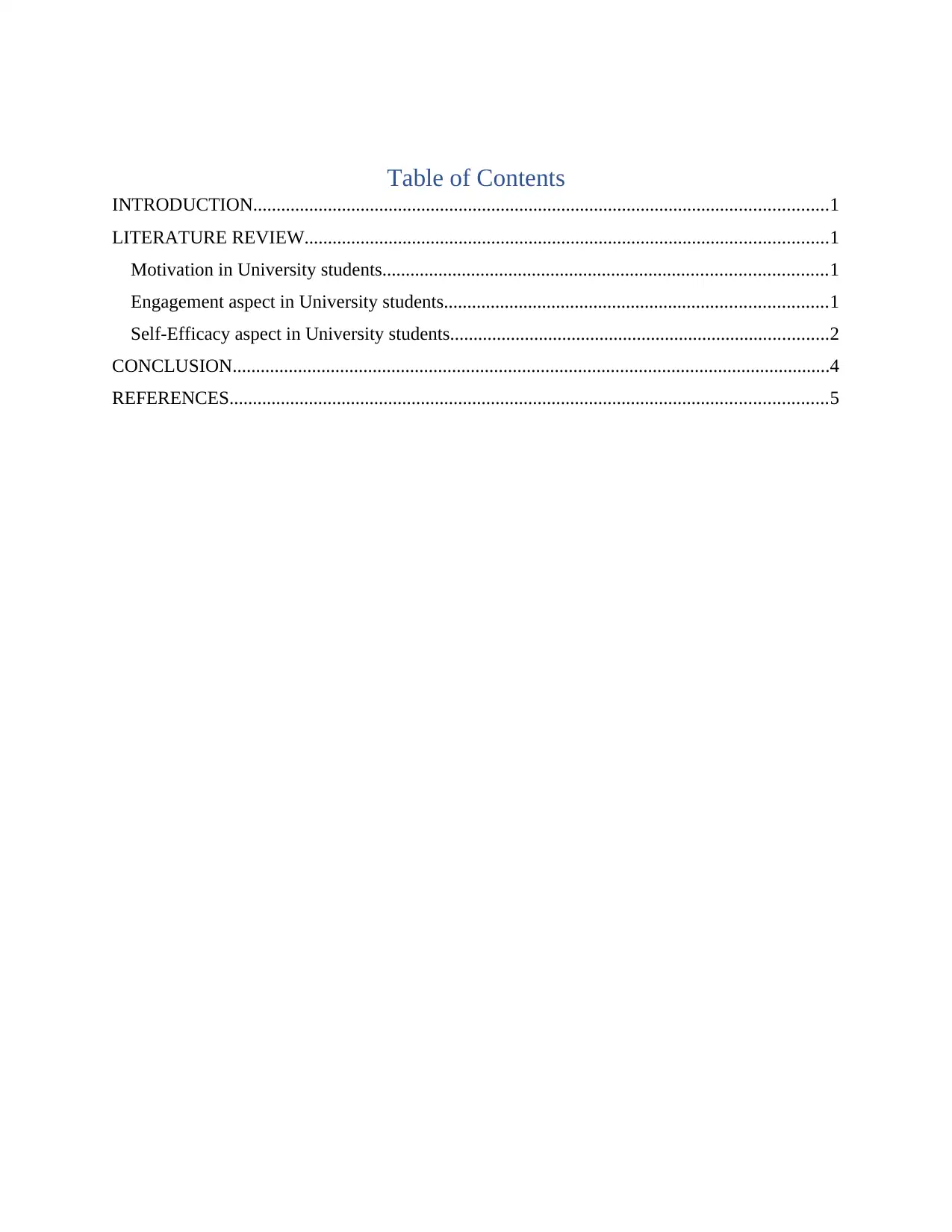
Table of Contents
INTRODUCTION...........................................................................................................................1
LITERATURE REVIEW................................................................................................................1
Motivation in University students...............................................................................................1
Engagement aspect in University students..................................................................................1
Self-Efficacy aspect in University students.................................................................................2
CONCLUSION................................................................................................................................4
REFERENCES................................................................................................................................5
INTRODUCTION...........................................................................................................................1
LITERATURE REVIEW................................................................................................................1
Motivation in University students...............................................................................................1
Engagement aspect in University students..................................................................................1
Self-Efficacy aspect in University students.................................................................................2
CONCLUSION................................................................................................................................4
REFERENCES................................................................................................................................5
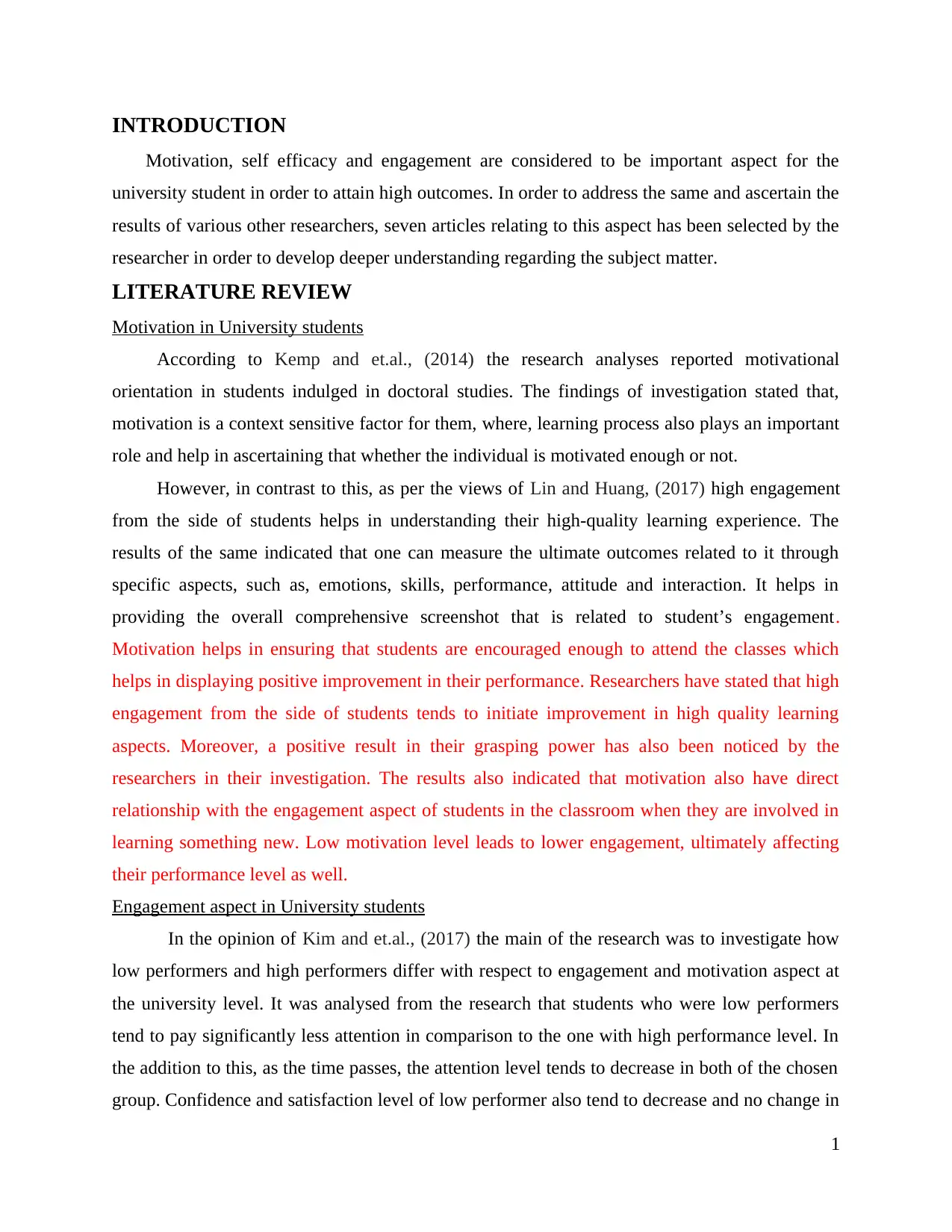
INTRODUCTION
Motivation, self efficacy and engagement are considered to be important aspect for the
university student in order to attain high outcomes. In order to address the same and ascertain the
results of various other researchers, seven articles relating to this aspect has been selected by the
researcher in order to develop deeper understanding regarding the subject matter.
LITERATURE REVIEW
Motivation in University students
According to Kemp and et.al., (2014) the research analyses reported motivational
orientation in students indulged in doctoral studies. The findings of investigation stated that,
motivation is a context sensitive factor for them, where, learning process also plays an important
role and help in ascertaining that whether the individual is motivated enough or not.
However, in contrast to this, as per the views of Lin and Huang, (2017) high engagement
from the side of students helps in understanding their high-quality learning experience. The
results of the same indicated that one can measure the ultimate outcomes related to it through
specific aspects, such as, emotions, skills, performance, attitude and interaction. It helps in
providing the overall comprehensive screenshot that is related to student’s engagement.
Motivation helps in ensuring that students are encouraged enough to attend the classes which
helps in displaying positive improvement in their performance. Researchers have stated that high
engagement from the side of students tends to initiate improvement in high quality learning
aspects. Moreover, a positive result in their grasping power has also been noticed by the
researchers in their investigation. The results also indicated that motivation also have direct
relationship with the engagement aspect of students in the classroom when they are involved in
learning something new. Low motivation level leads to lower engagement, ultimately affecting
their performance level as well.
Engagement aspect in University students
In the opinion of Kim and et.al., (2017) the main of the research was to investigate how
low performers and high performers differ with respect to engagement and motivation aspect at
the university level. It was analysed from the research that students who were low performers
tend to pay significantly less attention in comparison to the one with high performance level. In
the addition to this, as the time passes, the attention level tends to decrease in both of the chosen
group. Confidence and satisfaction level of low performer also tend to decrease and no change in
1
Motivation, self efficacy and engagement are considered to be important aspect for the
university student in order to attain high outcomes. In order to address the same and ascertain the
results of various other researchers, seven articles relating to this aspect has been selected by the
researcher in order to develop deeper understanding regarding the subject matter.
LITERATURE REVIEW
Motivation in University students
According to Kemp and et.al., (2014) the research analyses reported motivational
orientation in students indulged in doctoral studies. The findings of investigation stated that,
motivation is a context sensitive factor for them, where, learning process also plays an important
role and help in ascertaining that whether the individual is motivated enough or not.
However, in contrast to this, as per the views of Lin and Huang, (2017) high engagement
from the side of students helps in understanding their high-quality learning experience. The
results of the same indicated that one can measure the ultimate outcomes related to it through
specific aspects, such as, emotions, skills, performance, attitude and interaction. It helps in
providing the overall comprehensive screenshot that is related to student’s engagement.
Motivation helps in ensuring that students are encouraged enough to attend the classes which
helps in displaying positive improvement in their performance. Researchers have stated that high
engagement from the side of students tends to initiate improvement in high quality learning
aspects. Moreover, a positive result in their grasping power has also been noticed by the
researchers in their investigation. The results also indicated that motivation also have direct
relationship with the engagement aspect of students in the classroom when they are involved in
learning something new. Low motivation level leads to lower engagement, ultimately affecting
their performance level as well.
Engagement aspect in University students
In the opinion of Kim and et.al., (2017) the main of the research was to investigate how
low performers and high performers differ with respect to engagement and motivation aspect at
the university level. It was analysed from the research that students who were low performers
tend to pay significantly less attention in comparison to the one with high performance level. In
the addition to this, as the time passes, the attention level tends to decrease in both of the chosen
group. Confidence and satisfaction level of low performer also tend to decrease and no change in
1
⊘ This is a preview!⊘
Do you want full access?
Subscribe today to unlock all pages.

Trusted by 1+ million students worldwide
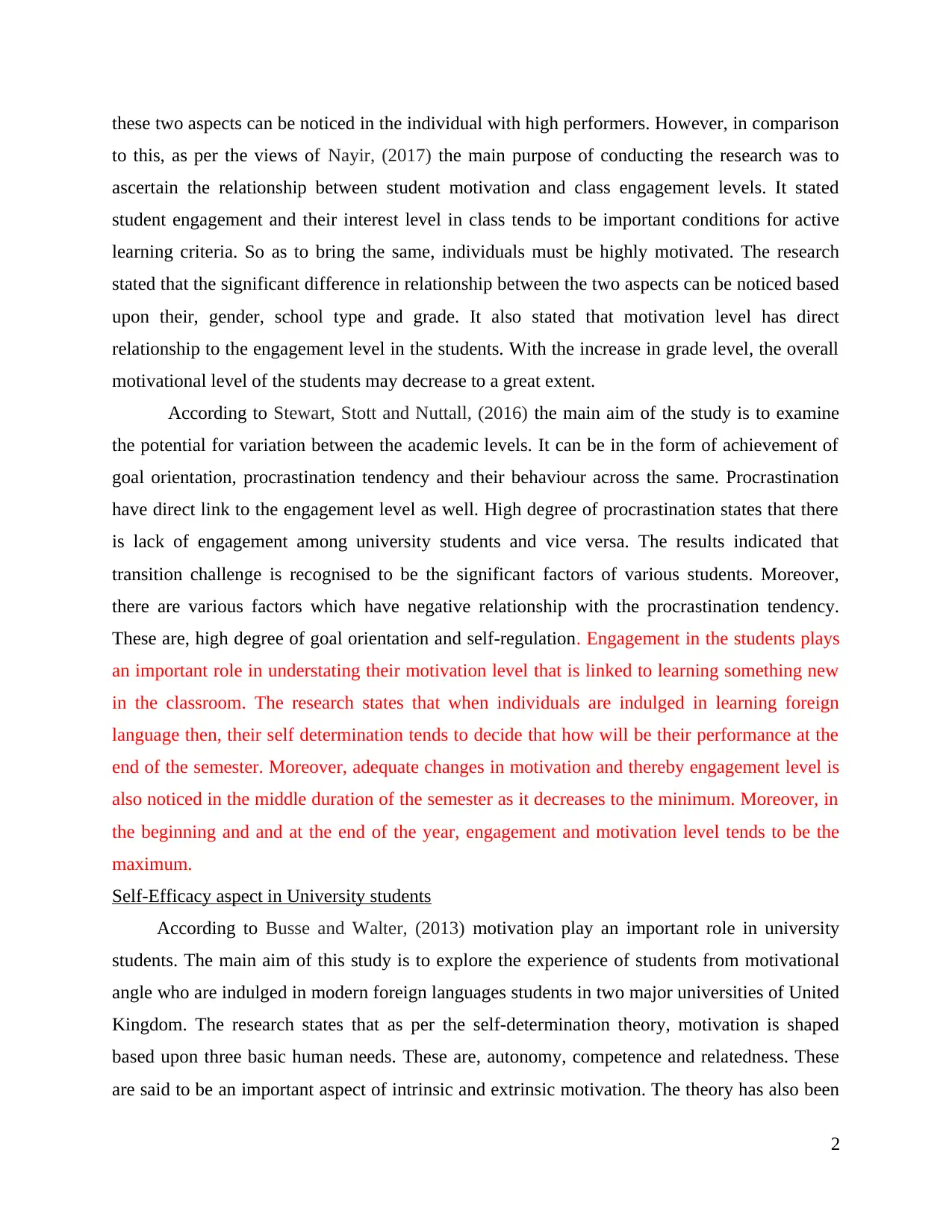
these two aspects can be noticed in the individual with high performers. However, in comparison
to this, as per the views of Nayir, (2017) the main purpose of conducting the research was to
ascertain the relationship between student motivation and class engagement levels. It stated
student engagement and their interest level in class tends to be important conditions for active
learning criteria. So as to bring the same, individuals must be highly motivated. The research
stated that the significant difference in relationship between the two aspects can be noticed based
upon their, gender, school type and grade. It also stated that motivation level has direct
relationship to the engagement level in the students. With the increase in grade level, the overall
motivational level of the students may decrease to a great extent.
According to Stewart, Stott and Nuttall, (2016) the main aim of the study is to examine
the potential for variation between the academic levels. It can be in the form of achievement of
goal orientation, procrastination tendency and their behaviour across the same. Procrastination
have direct link to the engagement level as well. High degree of procrastination states that there
is lack of engagement among university students and vice versa. The results indicated that
transition challenge is recognised to be the significant factors of various students. Moreover,
there are various factors which have negative relationship with the procrastination tendency.
These are, high degree of goal orientation and self-regulation. Engagement in the students plays
an important role in understating their motivation level that is linked to learning something new
in the classroom. The research states that when individuals are indulged in learning foreign
language then, their self determination tends to decide that how will be their performance at the
end of the semester. Moreover, adequate changes in motivation and thereby engagement level is
also noticed in the middle duration of the semester as it decreases to the minimum. Moreover, in
the beginning and and at the end of the year, engagement and motivation level tends to be the
maximum.
Self-Efficacy aspect in University students
According to Busse and Walter, (2013) motivation play an important role in university
students. The main aim of this study is to explore the experience of students from motivational
angle who are indulged in modern foreign languages students in two major universities of United
Kingdom. The research states that as per the self-determination theory, motivation is shaped
based upon three basic human needs. These are, autonomy, competence and relatedness. These
are said to be an important aspect of intrinsic and extrinsic motivation. The theory has also been
2
to this, as per the views of Nayir, (2017) the main purpose of conducting the research was to
ascertain the relationship between student motivation and class engagement levels. It stated
student engagement and their interest level in class tends to be important conditions for active
learning criteria. So as to bring the same, individuals must be highly motivated. The research
stated that the significant difference in relationship between the two aspects can be noticed based
upon their, gender, school type and grade. It also stated that motivation level has direct
relationship to the engagement level in the students. With the increase in grade level, the overall
motivational level of the students may decrease to a great extent.
According to Stewart, Stott and Nuttall, (2016) the main aim of the study is to examine
the potential for variation between the academic levels. It can be in the form of achievement of
goal orientation, procrastination tendency and their behaviour across the same. Procrastination
have direct link to the engagement level as well. High degree of procrastination states that there
is lack of engagement among university students and vice versa. The results indicated that
transition challenge is recognised to be the significant factors of various students. Moreover,
there are various factors which have negative relationship with the procrastination tendency.
These are, high degree of goal orientation and self-regulation. Engagement in the students plays
an important role in understating their motivation level that is linked to learning something new
in the classroom. The research states that when individuals are indulged in learning foreign
language then, their self determination tends to decide that how will be their performance at the
end of the semester. Moreover, adequate changes in motivation and thereby engagement level is
also noticed in the middle duration of the semester as it decreases to the minimum. Moreover, in
the beginning and and at the end of the year, engagement and motivation level tends to be the
maximum.
Self-Efficacy aspect in University students
According to Busse and Walter, (2013) motivation play an important role in university
students. The main aim of this study is to explore the experience of students from motivational
angle who are indulged in modern foreign languages students in two major universities of United
Kingdom. The research states that as per the self-determination theory, motivation is shaped
based upon three basic human needs. These are, autonomy, competence and relatedness. These
are said to be an important aspect of intrinsic and extrinsic motivation. The theory has also been
2
Paraphrase This Document
Need a fresh take? Get an instant paraphrase of this document with our AI Paraphraser
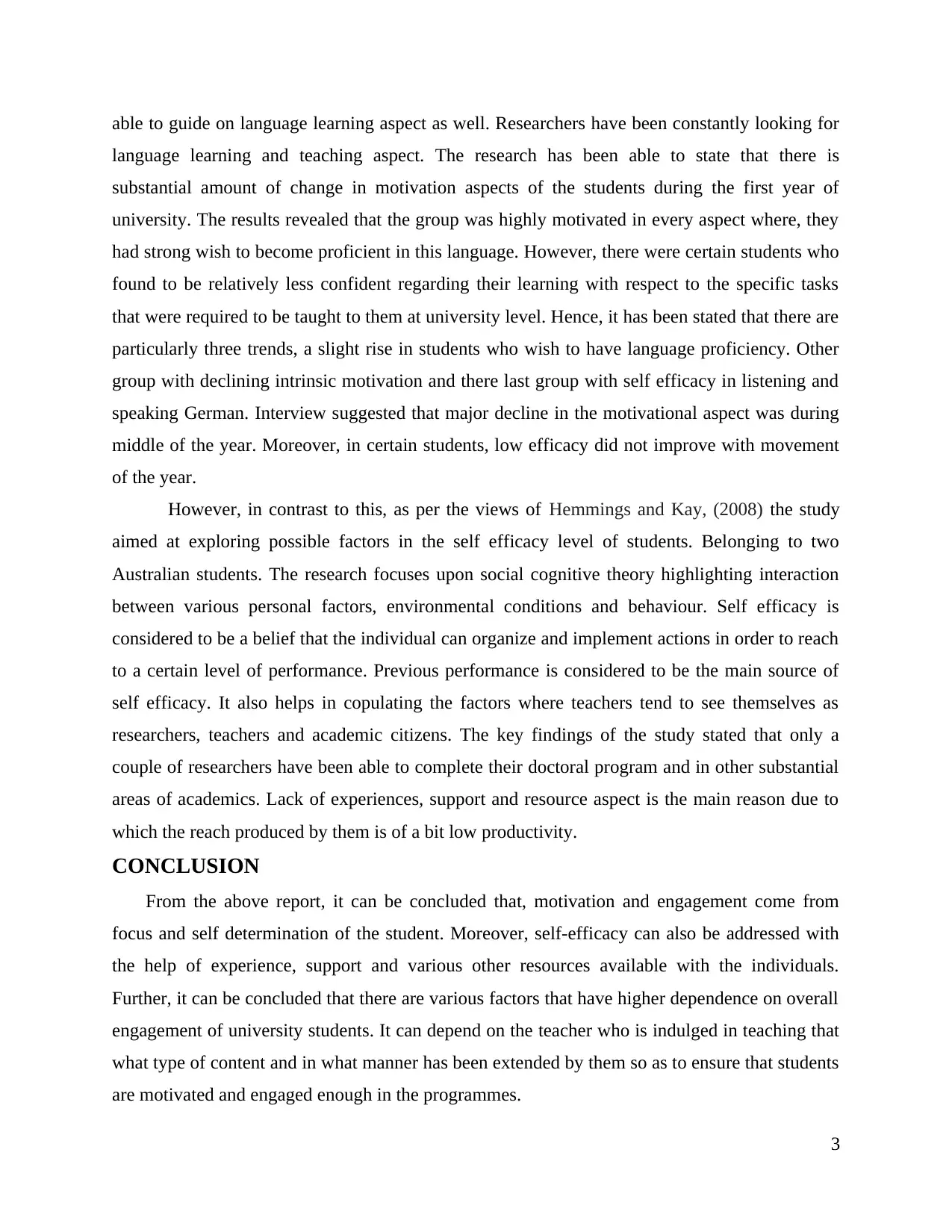
able to guide on language learning aspect as well. Researchers have been constantly looking for
language learning and teaching aspect. The research has been able to state that there is
substantial amount of change in motivation aspects of the students during the first year of
university. The results revealed that the group was highly motivated in every aspect where, they
had strong wish to become proficient in this language. However, there were certain students who
found to be relatively less confident regarding their learning with respect to the specific tasks
that were required to be taught to them at university level. Hence, it has been stated that there are
particularly three trends, a slight rise in students who wish to have language proficiency. Other
group with declining intrinsic motivation and there last group with self efficacy in listening and
speaking German. Interview suggested that major decline in the motivational aspect was during
middle of the year. Moreover, in certain students, low efficacy did not improve with movement
of the year.
However, in contrast to this, as per the views of Hemmings and Kay, (2008) the study
aimed at exploring possible factors in the self efficacy level of students. Belonging to two
Australian students. The research focuses upon social cognitive theory highlighting interaction
between various personal factors, environmental conditions and behaviour. Self efficacy is
considered to be a belief that the individual can organize and implement actions in order to reach
to a certain level of performance. Previous performance is considered to be the main source of
self efficacy. It also helps in copulating the factors where teachers tend to see themselves as
researchers, teachers and academic citizens. The key findings of the study stated that only a
couple of researchers have been able to complete their doctoral program and in other substantial
areas of academics. Lack of experiences, support and resource aspect is the main reason due to
which the reach produced by them is of a bit low productivity.
CONCLUSION
From the above report, it can be concluded that, motivation and engagement come from
focus and self determination of the student. Moreover, self-efficacy can also be addressed with
the help of experience, support and various other resources available with the individuals.
Further, it can be concluded that there are various factors that have higher dependence on overall
engagement of university students. It can depend on the teacher who is indulged in teaching that
what type of content and in what manner has been extended by them so as to ensure that students
are motivated and engaged enough in the programmes.
3
language learning and teaching aspect. The research has been able to state that there is
substantial amount of change in motivation aspects of the students during the first year of
university. The results revealed that the group was highly motivated in every aspect where, they
had strong wish to become proficient in this language. However, there were certain students who
found to be relatively less confident regarding their learning with respect to the specific tasks
that were required to be taught to them at university level. Hence, it has been stated that there are
particularly three trends, a slight rise in students who wish to have language proficiency. Other
group with declining intrinsic motivation and there last group with self efficacy in listening and
speaking German. Interview suggested that major decline in the motivational aspect was during
middle of the year. Moreover, in certain students, low efficacy did not improve with movement
of the year.
However, in contrast to this, as per the views of Hemmings and Kay, (2008) the study
aimed at exploring possible factors in the self efficacy level of students. Belonging to two
Australian students. The research focuses upon social cognitive theory highlighting interaction
between various personal factors, environmental conditions and behaviour. Self efficacy is
considered to be a belief that the individual can organize and implement actions in order to reach
to a certain level of performance. Previous performance is considered to be the main source of
self efficacy. It also helps in copulating the factors where teachers tend to see themselves as
researchers, teachers and academic citizens. The key findings of the study stated that only a
couple of researchers have been able to complete their doctoral program and in other substantial
areas of academics. Lack of experiences, support and resource aspect is the main reason due to
which the reach produced by them is of a bit low productivity.
CONCLUSION
From the above report, it can be concluded that, motivation and engagement come from
focus and self determination of the student. Moreover, self-efficacy can also be addressed with
the help of experience, support and various other resources available with the individuals.
Further, it can be concluded that there are various factors that have higher dependence on overall
engagement of university students. It can depend on the teacher who is indulged in teaching that
what type of content and in what manner has been extended by them so as to ensure that students
are motivated and engaged enough in the programmes.
3
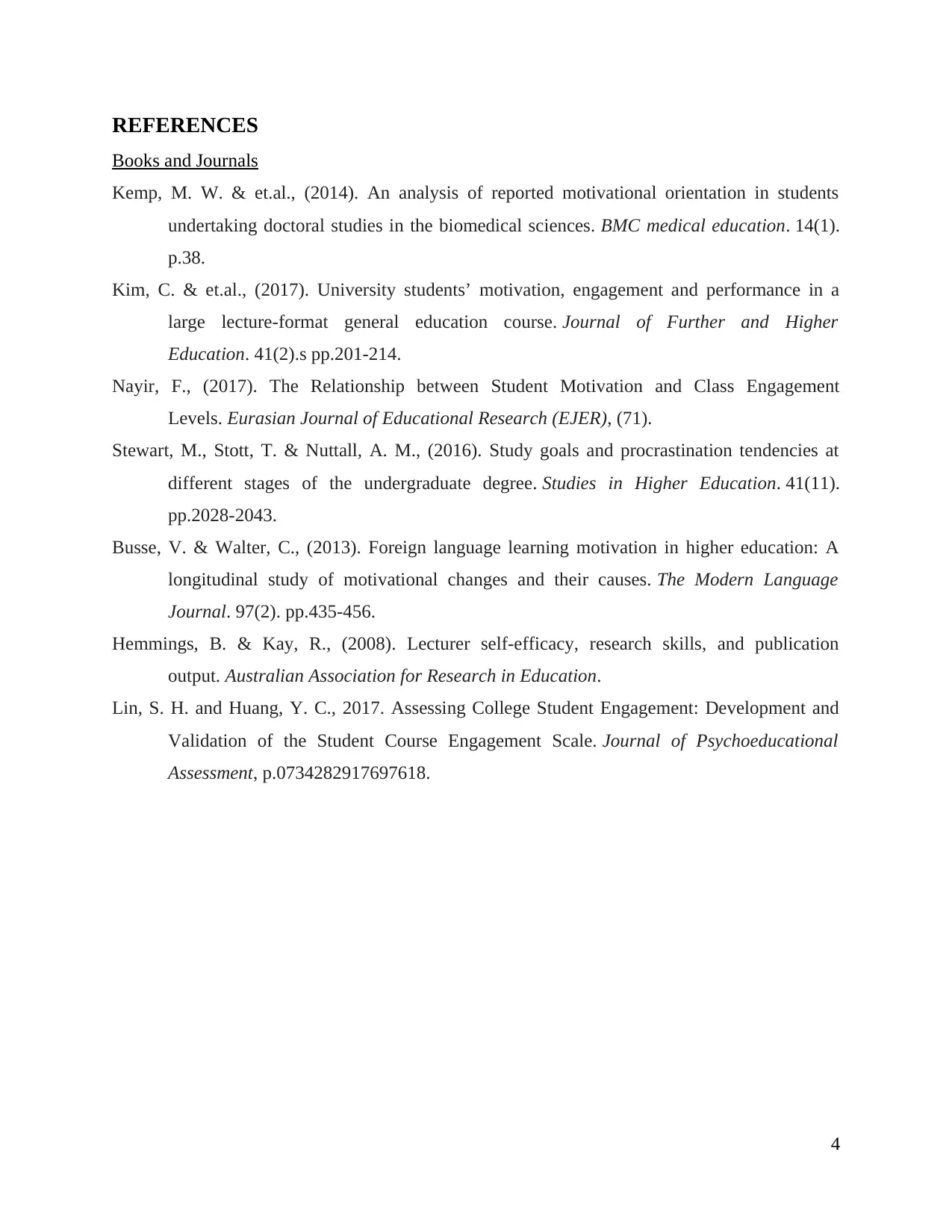
REFERENCES
Books and Journals
Kemp, M. W. & et.al., (2014). An analysis of reported motivational orientation in students
undertaking doctoral studies in the biomedical sciences. BMC medical education. 14(1).
p.38.
Kim, C. & et.al., (2017). University students’ motivation, engagement and performance in a
large lecture-format general education course. Journal of Further and Higher
Education. 41(2).s pp.201-214.
Nayir, F., (2017). The Relationship between Student Motivation and Class Engagement
Levels. Eurasian Journal of Educational Research (EJER), (71).
Stewart, M., Stott, T. & Nuttall, A. M., (2016). Study goals and procrastination tendencies at
different stages of the undergraduate degree. Studies in Higher Education. 41(11).
pp.2028-2043.
Busse, V. & Walter, C., (2013). Foreign language learning motivation in higher education: A
longitudinal study of motivational changes and their causes. The Modern Language
Journal. 97(2). pp.435-456.
Hemmings, B. & Kay, R., (2008). Lecturer self-efficacy, research skills, and publication
output. Australian Association for Research in Education.
Lin, S. H. and Huang, Y. C., 2017. Assessing College Student Engagement: Development and
Validation of the Student Course Engagement Scale. Journal of Psychoeducational
Assessment, p.0734282917697618.
4
Books and Journals
Kemp, M. W. & et.al., (2014). An analysis of reported motivational orientation in students
undertaking doctoral studies in the biomedical sciences. BMC medical education. 14(1).
p.38.
Kim, C. & et.al., (2017). University students’ motivation, engagement and performance in a
large lecture-format general education course. Journal of Further and Higher
Education. 41(2).s pp.201-214.
Nayir, F., (2017). The Relationship between Student Motivation and Class Engagement
Levels. Eurasian Journal of Educational Research (EJER), (71).
Stewart, M., Stott, T. & Nuttall, A. M., (2016). Study goals and procrastination tendencies at
different stages of the undergraduate degree. Studies in Higher Education. 41(11).
pp.2028-2043.
Busse, V. & Walter, C., (2013). Foreign language learning motivation in higher education: A
longitudinal study of motivational changes and their causes. The Modern Language
Journal. 97(2). pp.435-456.
Hemmings, B. & Kay, R., (2008). Lecturer self-efficacy, research skills, and publication
output. Australian Association for Research in Education.
Lin, S. H. and Huang, Y. C., 2017. Assessing College Student Engagement: Development and
Validation of the Student Course Engagement Scale. Journal of Psychoeducational
Assessment, p.0734282917697618.
4
⊘ This is a preview!⊘
Do you want full access?
Subscribe today to unlock all pages.

Trusted by 1+ million students worldwide
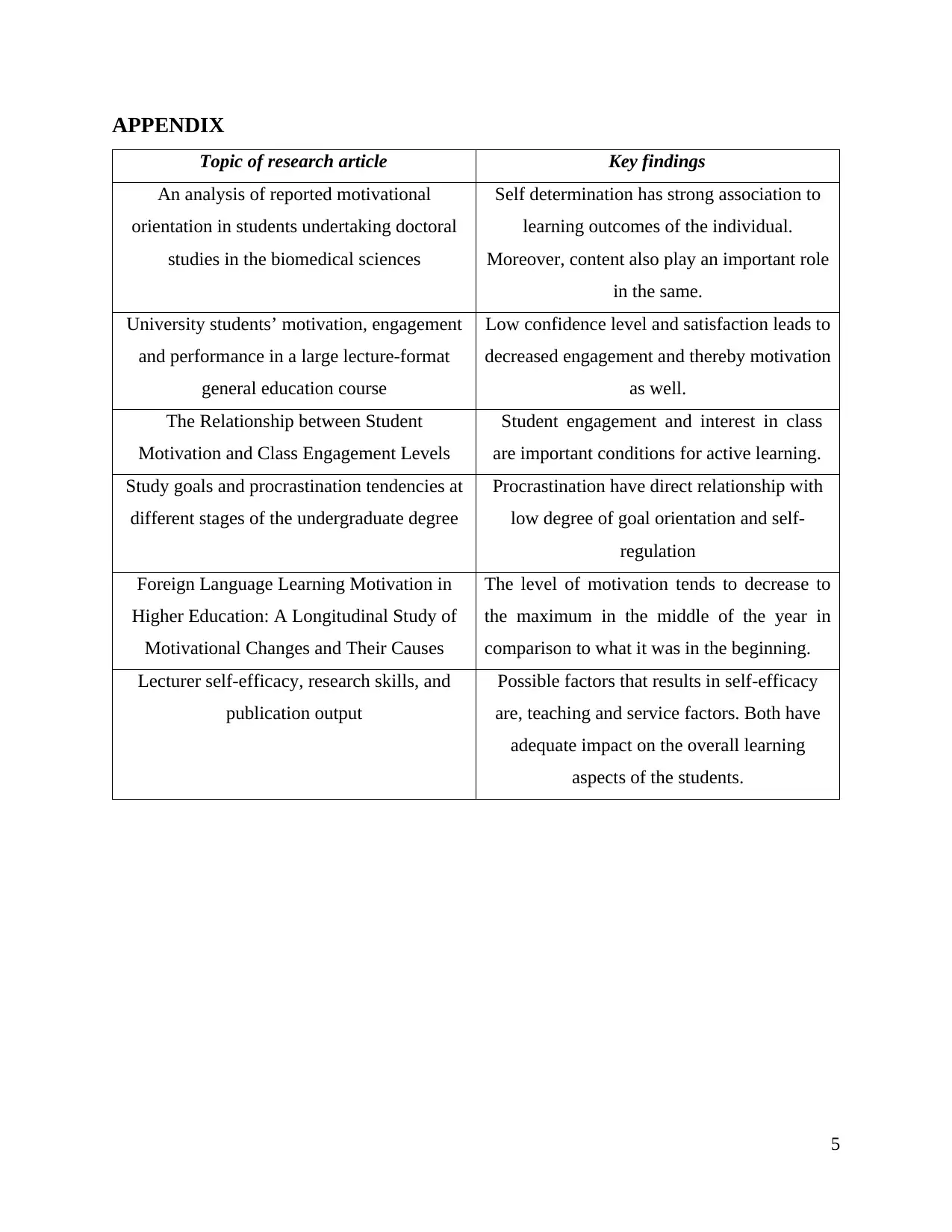
APPENDIX
Topic of research article Key findings
An analysis of reported motivational
orientation in students undertaking doctoral
studies in the biomedical sciences
Self determination has strong association to
learning outcomes of the individual.
Moreover, content also play an important role
in the same.
University students’ motivation, engagement
and performance in a large lecture-format
general education course
Low confidence level and satisfaction leads to
decreased engagement and thereby motivation
as well.
The Relationship between Student
Motivation and Class Engagement Levels
Student engagement and interest in class
are important conditions for active learning.
Study goals and procrastination tendencies at
different stages of the undergraduate degree
Procrastination have direct relationship with
low degree of goal orientation and self-
regulation
Foreign Language Learning Motivation in
Higher Education: A Longitudinal Study of
Motivational Changes and Their Causes
The level of motivation tends to decrease to
the maximum in the middle of the year in
comparison to what it was in the beginning.
Lecturer self-efficacy, research skills, and
publication output
Possible factors that results in self-efficacy
are, teaching and service factors. Both have
adequate impact on the overall learning
aspects of the students.
5
Topic of research article Key findings
An analysis of reported motivational
orientation in students undertaking doctoral
studies in the biomedical sciences
Self determination has strong association to
learning outcomes of the individual.
Moreover, content also play an important role
in the same.
University students’ motivation, engagement
and performance in a large lecture-format
general education course
Low confidence level and satisfaction leads to
decreased engagement and thereby motivation
as well.
The Relationship between Student
Motivation and Class Engagement Levels
Student engagement and interest in class
are important conditions for active learning.
Study goals and procrastination tendencies at
different stages of the undergraduate degree
Procrastination have direct relationship with
low degree of goal orientation and self-
regulation
Foreign Language Learning Motivation in
Higher Education: A Longitudinal Study of
Motivational Changes and Their Causes
The level of motivation tends to decrease to
the maximum in the middle of the year in
comparison to what it was in the beginning.
Lecturer self-efficacy, research skills, and
publication output
Possible factors that results in self-efficacy
are, teaching and service factors. Both have
adequate impact on the overall learning
aspects of the students.
5
1 out of 7
Related Documents
Your All-in-One AI-Powered Toolkit for Academic Success.
+13062052269
info@desklib.com
Available 24*7 on WhatsApp / Email
![[object Object]](/_next/static/media/star-bottom.7253800d.svg)
Unlock your academic potential
Copyright © 2020–2026 A2Z Services. All Rights Reserved. Developed and managed by ZUCOL.





